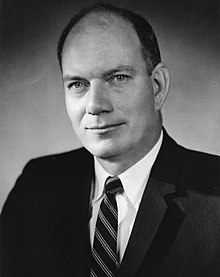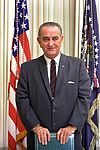Alan S. Boyd
Alan S. Boyd | |
|---|---|
 | |
| 1st United States Secretary of Transportation | |
| In office January 16, 1967 – January 20, 1969 | |
| President | Lyndon B. Johnson |
| Preceded by | Position established |
| Succeeded by | John A. Volpe |
| Personal details | |
| Born | July 20, 1922 Jacksonville, Florida, U.S. |
| Died | October 18, 2020 (aged 98) Seattle, Washington, U.S. |
| Political party | Democratic |
| Spouse |
Flavil Townsend
(m. 1943; died 2007) |
| Children | Mark |
| Education | University of Florida (BA) University of Virginia (LLB) |
| Military service | |
| Allegiance | |
| Branch/service | |
| Unit | |
| Battles/wars | World War II |
Alan Stephenson Boyd (July 20, 1922 – October 18, 2020) was an American attorney and transportation executive who led several large corporations and also served the U.S. Government in various transportation-related positions. He was the first United States Secretary of Transportation, appointed by Lyndon Johnson. Additionally, he served in executive positions with the Civil Aeronautics Board, the U.S. Department of Commerce, and was a president of Amtrak.
Early life and education
[edit]Boyd was born in Jacksonville, Florida, on July 20, 1922, to Clarence and Elizabeth (Stephenson) Boyd. His maternal great-grandfather was John Stephenson, a coachbuilder who invented and patented the first streetcar. Boyd's father died when he was two years old. He graduated from Macclenny–Glen High School in 1939, and went on to study at the University of Florida. However, he dropped out at the end of his sophomore year. He subsequently joined the United States Army Air Forces in 1942 and remained there through the end of World War II.[1]
Boyd married Flavil Juanita Townsend, a high school teacher,[1] on April 3, 1943.[2] Together, they had one son (Mark).[1] After leaving the service in 1945, Boyd returned to college and received his Bachelor of Laws from the University of Virginia School of Law in 1948.[1]
Career
[edit]Early positions
[edit]Boyd practiced law in Florida, and was on a commission exploring the regulation of the transportation industry. He was appointed to the Civil Aeronautics Board by Dwight Eisenhower in 1959. He was promoted to chairman of that board by John F. Kennedy. He helped the airline industry by standardizing fare reductions and by approving government subsidies to encourage airline service for smaller cities. He was appointed Under secretary of commerce for transportation in 1965 by Lyndon Johnson. He was unpopular with labor leaders when he advocated reducing government restrictions on the maritime industry, and when he denounced featherbedding by railroad workers. Boyd was part of a committee that lobbied for the creation of the United States Department of Transportation, bringing together many government agencies related to the transportation industry.[1][3]
Secretary of Transportation
[edit]Boyd became the first Secretary of Transportation in November 1966. In that capacity he worked in many areas including airports, the air traffic control system, automobile safety, driver education, alcoholism, and the highway beautification program (a pet project of first lady Lady Bird Johnson).[1] One of his sources of power was holding funding control over the interstate highways.[3] He was unsuccessful in trying to encourage passenger train service.[3][4]
When Richard Nixon became United States president in January 1969, Boyd left the Transportation Department to become the president of the Illinois Central Railroad, a position he held from 1969 to 1972.[5] The federal government investigated the potential conflict of interest because that railroad had received aid from Boyd's department before he resigned, but no wrongdoing was found. Boyd was later the president of Amtrak[6] until June 20, 1982,[7] and the president of Airbus Industrie.[8] He became the chairman of Warner Blue & Mahan, a Washington, D.C.–based consulting firm working on new technology ventures, in 1994.[9]
Later life and death
[edit]After Boyd retired, he and his wife moved to Seattle.[10] He received the Tony Jannus Award for his contributions to commercial aviation in 1994. He also received the 2009 Philip J. Klass Award for Lifetime Achievement from Aviation Week & Space Technology. The citation read: "... for his lifelong service to aviation, including shaping policy in the U.S."[11]
Boyd published an autobiography, A Great Honor: My Life Shaping 20th Century Transportation in August 2016.[12]
Boyd died on October 18, 2020, at a retirement home in Ravenna, Seattle. He was 98, and suffered from failing eyesight in the last five years of life.[1]
See also
[edit]References
[edit]- ^ a b c d e f g McFadden, Robert D. (October 19, 2020). "Alan S. Boyd, Nation's First Transportation Chief, Dies at 98". The New York Times. Retrieved October 19, 2020.
- ^ Sobel, Robert (1990). Biographical Directory of the United States Executive Branch, 1774–1989. Greenwood Publishing Group. p. 37. ISBN 9780313265938.
- ^ a b c "Alan S. Boyd (1967–1969)". Miller Center of Public Affairs. University of Virginia. October 4, 2016. Retrieved October 19, 2020.
- ^ Knight, Jerry (February 20, 1981). "Amtrak Asks More Aid Than Reagan Proposes". The Washington Post. Retrieved October 19, 2020.
- ^ Stover, John F. "The Management of the Illinois Central Railroad in the 20th Century" (PDF). Retrieved February 9, 2006.
- ^ "Ax for Amtrak". Time. March 19, 1979. Archived from the original on October 13, 2007. Retrieved August 16, 2007.
- ^ "Today in Florida History for January". Archived from the original on July 22, 2007. Retrieved August 16, 2007.
- ^ "Alan Boyd". National Academy of Public Administration. Retrieved October 19, 2020.
- ^ "Appointments – Companies". The Washington Post. March 7, 1994. Retrieved October 19, 2020.
- ^ Apgar, Fred (January 19, 2012). "Distinguished veteran and public servant addresses VFW Post". Edmonds Beacon. Retrieved October 19, 2020.
- ^ Aviation Week & Space Technology January 12, 2009, "Laureates 2009", p. 57
- ^ A Great Honor: My Life Shaping 20th Century Transportation. Artisan Island Press. August 6, 2016.
External links
[edit]- Appearances on C-SPAN
 Media related to Alan Stephenson Boyd at Wikimedia Commons
Media related to Alan Stephenson Boyd at Wikimedia Commons
- 1922 births
- 2020 deaths
- United States Army Air Forces personnel of World War II
- 20th-century American railroad executives
- Amtrak presidents
- Florida Democrats
- Florida lawyers
- Illinois Central Railroad
- Lyndon B. Johnson administration cabinet members
- 20th-century American politicians
- Military personnel from Florida
- People from Edmonds, Washington
- United States Army Air Forces soldiers
- United States Under Secretaries of Commerce
- Secretaries of transportation of the United States
- University of Florida alumni
- University of Virginia School of Law alumni
- Writers from Jacksonville, Florida
- American autobiographers


